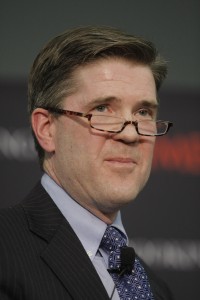The Blue Economy
 John Austin, Director of the Michigan Economic Center at Prima Civitas, will be the lunch keynote speaker at the Spokane River Forum Conference on Thursday, March 24th.
John Austin, Director of the Michigan Economic Center at Prima Civitas, will be the lunch keynote speaker at the Spokane River Forum Conference on Thursday, March 24th.
John coined the term the “blue economy” to describe waterways and water innovation that can define the uniqueness of communities and drive economic growth. In Michigan, said John, “The blue economy tap root accounts for 1 in 5 or nearly one million jobs, and has a $60 billion dollar annual economic impact.”
In reports crafted over the last decade, John’s brought vision, definition and direction to a transition away from water being primarily a natural resource to power an industrial economy. In the new norm, water is central to supporting 21st Century placemaking and potentially driving economic development as new water based technologies and services are exported internationally.
What John sees as opportunities being seized for the great lakes and rivers of Michigan are eerily similar to what is happening in our region. “It’s a three legged stool,” said John, and “it begins with placemaking.” Areas with clean, bountiful water are choice locations to live, work and play. Investments in waterfront restoration, access, recreation and hospitality drive economic growth while also being a symbol of community values. The Spokane River Water Trail and Coeur d’Alene “Our Gem” Lake Symposium speak to our values and opportunities.
The second leg is water technology products and services, which includes things like new water cleaning and efficiency tools, “green infrastructure,” and wastewater infrastructure design. Conference presentations on bio-char, permeable pavement, algae to remove constituents like phosphorus and nitrogen, and PCB “eating” oyster mushroom mycelium fit with John’s message. What’s the value to our community of creating green solution success? What’s the value to our economy if these technologies are successfully exported to others?
And the last leg is water education, research and innovation centers. Spokane’s University District, the University of Idaho’s Community Water Resource Center in Coeur d’Alene, WSU’s Center for Environmental Research, Education and Outreach, and the Idaho Water Resources Research Institute will all be making conference presentations. “Frankly,” said Forum Director Andy Dunau, “we’ve got an embarrassment of higher education riches coming to the table. John’s giving us a framework and challenging us to leverage their research, ability to access to federal and other grants, and use their sheer brainpower to meet our needs.”
John would be the first to say Michigan isn’t the only place where unique water and innovation advantages can lead to grabbing a share of the growing global water solutions business. As we learn from John’s research and listen to his opportunistic message, ask, “Can this be our future too?”
